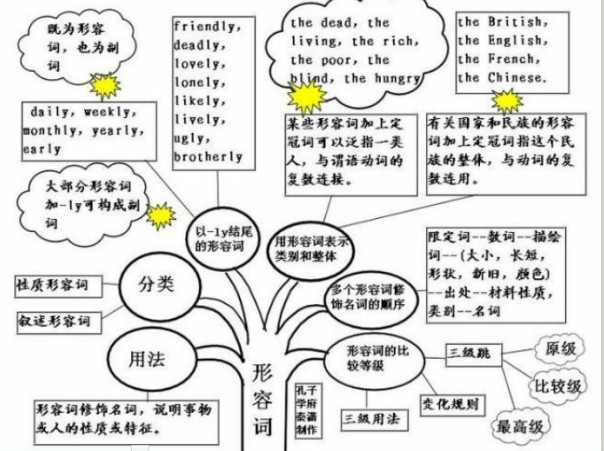本试题 “The _____ look on his face suggested that he hadn't expected _____ would happen.A. surprised; whatB. surprising; whatC. surprised; thatD. surprisin...” 主要考查您对连接代词
形容词
等考点的理解。关于这些考点您可以点击下面的选项卡查看详细档案。
- 连接代词
- 形容词
连接代词的概念:
连接代词常用来引导一个主语从句、宾语从句和表语从句,在句中可用作主语、宾语、表语、定语等,连接代词主要包括who, whom, what, which, whose, whoever, whatever, whichever, whosever等。
whatever, whoever, whichever 用法说明:
主要用于引导主语从句和宾语从句。
如:He does whatever she asks him to do. 她要他做什么,他就做什么。
Whoever breaks the rules will be punished.谁违反这些规则都将受到处罚。
I'll give the ticket to whoever want sit. 请想要这票,我就把它给谁。
Whichever team gains the most points wins. 哪个队得分最多,哪个队就赢。
注:其中的ever主要用于加强语气,含有“一切”、“任何”、“无论”之义。使用这类词时,注意不要按汉语习惯用错句子结构:
如:任何人(谁)先来都可以得到一张票。
误:Anyone comes first can get a ticket./ Who comes first can get a ticket.
正:Anyone who comes first can get a ticket./ Whoever comes first can get a ticket.
连接代词的用法:
1、连接代词主要包括who, whom, what, which, whose, whoever, whatever, whichever, whosever等,它们在句中可用作主语、宾语、表语、定语等,可以引导主语从句、宾语从句和表语从句:
如:I don't know who he is. 我不知道他是谁。
What he says sounds reasonable. 他说的话听起来很有道理。
The question is who(m) we should trust. 问题是我们该信任谁。
I'll take whoever wants to go. 谁想去我就带谁去。
Take whichever seat you like? 你喜欢坐哪个座位就坐哪个?
I will just say whatever comes into my mind. 我想到什么就说什么。
注:who, whom, whoever等不用于名词前作定语。
2、what的两种用法。请看以下两个句子:
(1)I didn't know what he wanted. 我不知道他想要什么。
(2)I gave her what she wanted. 我给了她想要的一切。
上面第一句中的what表示“什么”,带有疑问的意味;第二句中的what表示“所…的一切事或东西”,其意义上大致相当于that(those) which, the thing(things) that, anything that, all that, as much as等,又如:
What[=That which] you say is quite true. 你说的完全是事实。
He saves what[=all that] he earns. 他赚多少,积蓄多少。
Call it what[=anything that] you please. 你喜欢叫它什么就叫它什么。
这样用的what有时还可后接一个名词:
如:He gave me what money[=all the money that] he had about him. 他把身边带有的钱全给了我。
What friends[=All the friends that] he has are out of the country. 他所有的朋友都在国外。
连接代词知识体系:

whatever, whoever, whichever 用法说明:
主要用于引导主语从句和宾语从句。
如:He does whatever she asks him to do. 她要他做什么,他就做什么。
Whoever breaks the rules will be punished.谁违反这些规则都将受到处罚。
I'll give the ticket to whoever want sit. 请想要这票,我就把它给谁。
Whichever team gains the most points wins. 哪个队得分最多,哪个队就赢。
注:其中的ever主要用于加强语气,含有“一切”、“任何”、“无论”之义。使用这类词时,注意不要按汉语习惯用错句子结构:
如:任何人(谁)先来都可以得到一张票。
误:Anyone comes first can get a ticket./ Who comes first can get a ticket.
正:Anyone who comes first can get a ticket./ Whoever comes first can get a ticket.
形容词的概念:
形容词(adjective),简称adj.或a,形容词用来修饰名词或代词,表示人或事物的性质、状态,和特征的程度好坏与否,形容词在句中作定语、表语、宾语补足语。通常,可将形容词分成性质形容词和叙述形容词两类,其位置不一定都放在名词前面。
形容词的作用与位置:
形容词是用来修饰名词的,常被放在名词前作定语,或放在系动词后面作表语。以下属几种特殊情况,须牢记;
(1)形容词短语作定语,定语后置。
如:a language difficult to master,
a leaning tower about 180 feet high
(2)表语形容词(afraid、alike、alone、asleep、awake、alive等)作定语,定语后置。如a man alive。有些表身体健康状况的形容词如well、faint、ill只作表语。sick既可作表语又可作定语,ill如作定语意为“bad”。
(3)用作定语,修饰由不定代词one、no、any、some和every构成的复合词如anything、something等时,通常后置。
如:I have something important to tell you.
(4)else常用作疑问代词和不定代词的后置定语。
(5)enough、nearby修饰名词前置或后置,程度副词一般位于形容词、副词前面,enough修饰形容词、副词时,必须后置。
(6)几个并列的形容词作定语,其语序通常为:限定语(The、A)+描绘性形容词+size(大小)+shape(形状)+age(年龄、时间)+color(颜色)+origin(国籍、来源)+material(材料)+purpose(目的)+名词。
口诀:
限定描绘大长高,形状年龄和新老;颜色国籍跟材料,作用类别往后靠。
如:a heavy black Chinese steel umbrella,
the man's first tow interesting little red French oil paintings
形容词的用法:
1、形容词修饰名词,说明事物或人的性质或特征。通常,可将形容词分成性质形容词和叙述形容词两类,其位置不一定都放在名词前面:
1)直接说明事物的性质或特征的形容词是性质形容词,它有级的变化,可以用程度副词修饰,在句中可作定语、表语和补语。例如:hot热的。
2)叙述形容词只能作表语,所以又称为表语形容词。这类形容词没有级的变化,也不可用程度副词修饰。
大多数以a开头的形容词都属于这一类。例如:
afraid害怕的。(错)Heisanillman. (对)Themanisill. (错)Sheisanafraidgirl. (对)Thegirlisafraid.
这类词还有:well,unwell,ill,faint,afraid,alike,alive,alone,asleep,awake等。
3)形容词作定语修饰名词时,要放在名词的前边。但是如果形容词修饰以-thing为字尾的词语时,要放在这些词之后。例如:somethingnice
2、用形容词表示类别和整体:
1)某些形容词加上定冠词可以泛指一类人,与谓语动词的复数连接。如:the dead,the living,the rich,the poor,the blind,the hungry The poorarelosinghope.穷人失去了希望。
2)有关国家和民族的形容词加上定冠词指这个民族的整体,与动词的复数连用。如:the British,the English,the French,the Chinese. The English have wonderful senseofhumor.
以-ly结尾的形容词:
1)大部分形容词加-ly可构成副词。但friendly,deadly,lovely,lonely,likely,lively,ugly,brotherly,仍为形容词。改错:
如:(错)She sang lovely.
(错)He spoke to me very friendly.
(对)Her singing was lovely.
(对)He spoke to me in a very friendly way.
2)有些以-ly结尾既为形容词,也为副词。 daily,weekly,monthly,yearly,early .
如:The Times is a daily paper.
The Times is published daily.
形容词知识体系:

复合形容词的构成:
(1)形容词+名词+ed:
如:kind-hearted 好心的,white-haired 白发的
(2)形容词+形容词:
如:red-hot 炽热的,dark-blue 深蓝的
(3)形容词+现在分词:
如:good-looking 好看的,easy-going 随和的
(4)副词+现在分词:
如:hard-working 勤劳的,fast-moving 快速转动的
(5)副词+过去分词:
如:hard-won 得来不易的,newly-made 新建的
(6)名词+形容词:
如:life-long 终生的,world-famous 世界闻名的
(7)名词+现在分词:
如:peace-loving 爱好和平的,fun-loving 爱开玩笑的
(8)名词+过去分词:
如:snow-covered 白雪覆盖的,hand-made 手工的
(9)数词+名词+ed:
如:four-storeyed 4层楼的,three-legged 3条腿的
(10)数词+名词(名词用单数):
如:ten-year 10年的, two-man 两人的
与“The _____ look on his face suggested that he hadn't expec...”考查相似的试题有:
- —Are you satisfied with what he did? —No, it couldn’t have been ______.A.worseB.betterC.so badD.the worse
- — Can I buy Jane Ryre here?— Sorry, but we'll call you as soon as it becomes _____.[ ]A. presentB. availableC. conven...
- Your water bill is ________ to be paid.[ ]A. ashamedB. dueC. unfitD. tough
- My friend does one thing one day and just the ________the next. His behavior is inconsistent.[ ]A. positiveB. alterna...
- If you have to catch the first bus every day,choose this hotel.It is very________for the station-it's only atwo-minut...
- It was the news that two lions had run away from the zoo that ________ the local people.[ ]A. delightedB. alarmedC. s...
- —Do you regret paying 500 dollars for your necklace?--No, I would gladly pay__________ for it.A.two times as muchB....
- 单词拼写。根据汉语提示填出正确的单词形式。将答案完整的填写在横线上。1. At the bad news, you should keep yourself ____...
- ________the temperature, ________ water turns into steam.A.The high; the fastB.Higher; fasterC.The more higher; th...
- ______ the students in our school go to college in their teens.A.A good manyB.A great many ofC.A great deal ofD.A...